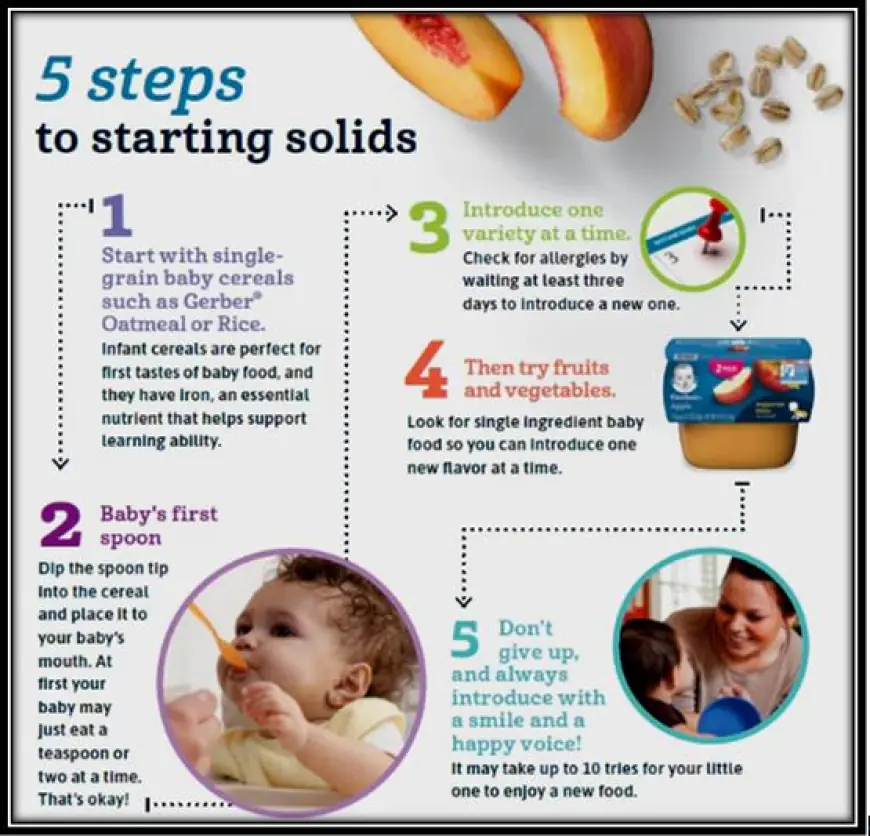When Is It Safe to Introduce Solid Foods to Your Baby?
Discover the best time to introduce solid foods to your baby. Expert tips, safe practices, and essential guidelines for a healthy start. Learn more!

Importance of Introducing Solid Foods
Introducing solid foods to your baby is an essential milestone in their development, contributing to their physical and cognitive growth. The introduction of new tastes and textures can help expand their palate, setting the stage for a lifetime of healthy eating habits. Furthermore, solid foods provide vital nutrients that are not present in breast milk or formula, such as iron and zinc, which are crucial for proper brain development and overall growth.
In addition, the introduction of solid foods can contribute to enhanced motor skills as babies learn to pick up and self-feed various types of food. This process also encourages the development of hand-eye coordination and jaw strength, laying the foundation for speech development. By gradually introducing different types of solid foods, parents can expose their babies to a wide array of flavors early on, potentially reducing picky eating habits later in life. Overall, the importance of introducing solid foods lies in providing essential nutrients, fostering healthy eating behaviors, and supporting various aspects of infant development.
Signs Your Baby is Ready
As a parent, recognizing the signs that your baby is ready for solid foods is crucial. One telltale sign is when your little one can sit up unassisted and has good head control. This indicates they are developing the physical skills needed to safely swallow solid foods. Additionally, if your baby shows an interest in what you're eating, reaches out for your food, or seems dissatisfied after breastfeeding or bottle feeding, these could also be signals that they are ready to explore new tastes and textures.
Another important indicator is when your baby starts to grab and bring objects to their mouth. This action demonstrates their ability to coordinate hand-to-eye movements and signifies their readiness for self-feeding. It's essential to pay attention to these cues from your baby as they give valuable insights into their developmental stage and readiness for solid foods. By recognizing these signs, you can ensure a smooth transition to introducing solids while supporting your baby's growth and nutritional needs.
Types of Solid Foods to Start With
As a parent, deciding when to introduce solid foods to your baby is an important milestone. But what types of solid foods should you start with? It's essential to choose foods that are easy for your baby to digest and unlikely to cause allergic reactions. In general, single-ingredient purees such as sweet potatoes, carrots, peas, and apples are great options for introducing solids. These foods are rich in essential nutrients and can help your baby develop a taste for different flavors and textures.
Additionally, incorporating iron-rich foods like fortified infant cereals or pureed meats into your baby's diet can help support their rapid growth and brain development. Experimenting with different combinations of fruits and vegetables can also introduce variety and stimulate your baby's palate. Remember that every baby is unique, so it's important to monitor their reactions closely when introducing new solid foods. By gradually introducing a diverse range of nutritious options, you can lay the foundation for healthy eating habits that will benefit your child throughout their life.
Safe Practices for Introducing Solids
Introducing solid foods to your baby is an exciting milestone, but it's important to approach it with caution. One of the safest practices for introducing solids is to start with single-ingredient foods, such as pureed fruits or vegetables, before moving on to more complex combinations. This allows you to monitor your baby for any potential allergies and helps them get used to different flavors and textures gradually.
Another safe practice is to wait until your baby shows readiness signs, like sitting up unassisted and showing interest in food. Rushing this process can lead to digestive issues and a negative association with eating. Additionally, avoiding added sugars and salt in homemade baby meals is crucial for their developing taste preferences and long-term health. By approaching the introduction of solids with care and attention, you can lay the foundation for a lifetime of healthy eating habits for your little one.

Potential Risks to Consider
When considering the introduction of solid foods to your baby, it's crucial to be aware of potential risks that can arise. One significant risk is the possibility of choking. Babies have not fully developed their chewing and swallowing abilities, and certain foods can pose a choking hazard. Additionally, introducing allergenic foods too early could increase the risk of food allergies in your child. It's important to be mindful of family history as well as consulting with a pediatrician to determine when it's safe to introduce these allergens.
Another potential risk to consider is digestive issues. Introducing solid foods too early can put stress on an immature digestive system, leading to discomfort and potential complications like constipation or diarrhea. It’s essential to pay attention to your baby’s cues and gradually introduce new foods while observing how their body reacts. By being aware of these risks and taking necessary precautions, you can ensure a safe transition from breastfeeding or formula feeding to solid foods for your little one.
Gradually Increasing Food Variety
As babies grow and develop, gradually increasing food variety can play a crucial role in shaping their palate and overall health. Introducing a wide range of flavors and textures early on can help children become more adventurous eaters as they get older. Research has shown that infants who are exposed to diverse foods during weaning tend to be less picky and more willing to try new things later in life. By progressively incorporating different fruits, vegetables, grains, and proteins into a baby's diet, parents can set the stage for a lifetime of healthy eating habits.
Furthermore, offering a variety of nutrient-rich foods can ensure that babies receive a wide array of essential vitamins and minerals necessary for growth and development. Each type of food brings its own unique nutritional benefits, so exposing babies to different options can help prevent deficiencies and support overall well-being. Additionally, introducing diverse flavors early on may reduce the risk of developing allergies by allowing the baby's immune system to learn how to recognize and tolerate various ingredients. Gradually expanding food variety is not only about creating exciting culinary experiences for babies but also laying the foundation for lifelong wellness through healthy eating behaviors.
Conclusion: Ensuring a Safe and Healthy Transition
In conclusion, ensuring a safe and healthy transition to solid foods for your baby is a crucial aspect of their early development. It's important to closely monitor your baby's readiness for solids and not rush the process. Introducing a wide variety of nutritious foods gradually can help prevent allergies and promote a well-rounded palate.
Additionally, practicing good food hygiene, such as washing hands and utensils thoroughly, can minimize the risk of foodborne illnesses. Always supervise your baby during mealtimes to prevent choking hazards and encourage positive eating habits. By being mindful of these factors, you can lay the foundation for a lifetime of healthy eating habits for your little one.







